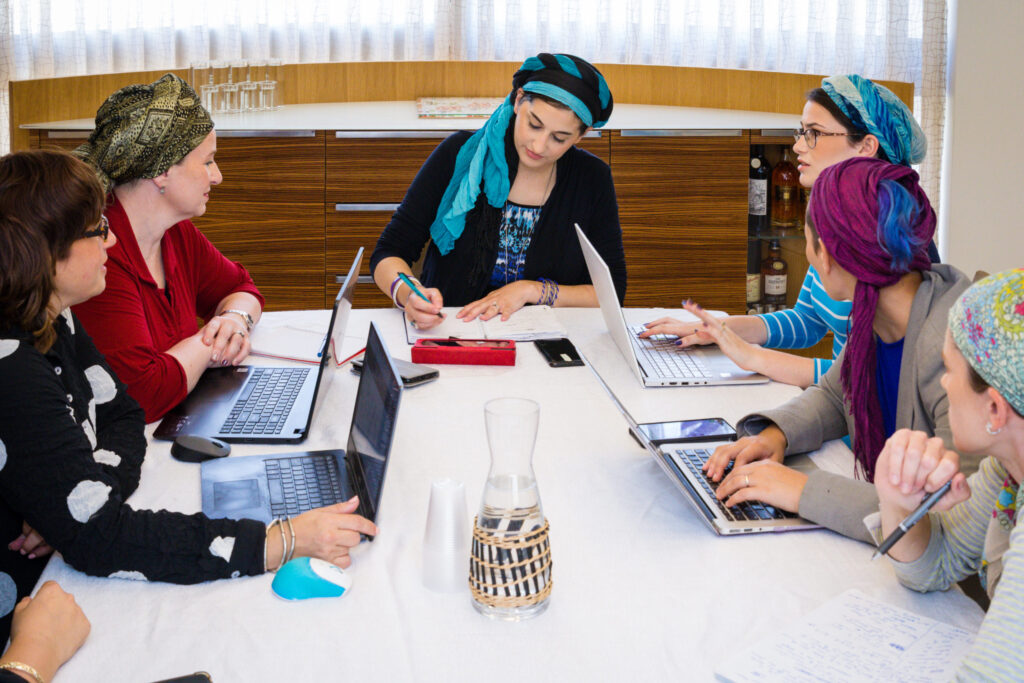[vc_row row_type=”row” use_row_as_full_screen_section=”no” type=”full_width” text_align=”left” box_shadow_on_row=”no”][vc_column][vc_column_text]
A Response to Cross Currents
[/vc_column_text][vc_column_text]Cross Currents published a piece that we wrote about the importance of yoatzot halacha. They felt it necessary to temper the message by appending their own introduction and commentary. In an interesting turn of events, the grounds for their opposition actually strengthen what they attempt to discredit. Here are their arguments:
The first assertion is that there is no reason for women to feel uncomfortable when talking about intimate topics with their rabbis because there aren’t actually taboos about sexuality in the frum community. In today’s climate, frum women and men engage in an entirely open, healthy dialogue about women’s bodies. Tznius doesn’t hold the prominent role in religious circles that we imagine it does. Yet, a quick glance at the typical women’s curriculum, shiurim, tznius asifas, and women-free magazines, newspapers, and advertisements can attest to the veracity of this statement. While ideally, body shaming and all its social baggage would have no place in religious society, the situation on the ground tells a different story. Yoatzot are the heroes Gotham needs, not the heroes it deserves.
The argument continues. If, even after being reassured by a man that her socially inculcated feelings of awkwardness don’t actually exist, a woman still feels uncomfortable inviting men into intimate conversations about her menstrual cycle, she can put herself at ease with this simple solution: Remove herself from the discussion entirely. Conduct the entire conversation between the husband and the rabbi only. Practically speaking, this leads to broken telephone situations and runs the very real risk of getting the wrong answer to an accidentally misrepresented question. Some questions won’t be asked or answered and relevant details won’t be accurately relayed. On a deeper level, the removal of women from conversations about the most intimate details of their own bodies in favor of replacing them with men is absurd on a variety of levels.
The next argument is a familiar, recurring theme that inevitably arises in frum literature on the topic of women’s scholarship: A woman can never achieve the same caliber of scholarship as a man. While openly acknowledging that they have no knowledge of the yoetzet training program’s curriculum, rigor or scope, the Cross-Currents authors dismiss it out of hand. They balk at the notion that any woman would be as knowledgeable as they are in the intricacies of various halachic mechanisms. In other words, the Hipster Halachist is an expert in sugyas you probably never even heard of.
But as one reader of the Cross Current’s blog points out, yoatzot do study Chavot Da’at and Sidrei Taharah, and spend many more hours studying the sugyot through the Gemara, Rishonim, Achronim and modern day poskim than their counterparts in current semicha programs for men. Instead of disparaging the “drips and drabs of rabbinic jargon learned in a sub-standard program,” as one commenter describes, the men at Cross Currents would have heard the following had they but bothered to ask a yoetzet: “There is a prerequisite level of learning to get into the Yoetzet Program,” Ora Derovan, a yoetzet, writes. “More women get turned away than get accepted. What we do learn, meaning all of Shas, Tur, Beit Yosef and Poskim and all of the Shulchan Aruch and Nosei Kelim on Hillchot Niddah, we learn on a very high level. A few days after I finished my final exam I happened to see the Rabbanut HaRashit’s exam. Not only did I know all the answers, I found it easy. I was asked harder questions in my yoetzet exam. We take a four hour long oral exam with four different Rabbis including Rav Henkin, and it is very thorough. Not everyone passes.” The irony is lost on an article that makes a case for extensive knowledge and research by basing its objection on absolutely nothing but assumptions and bias.
Of course, no criticism of women would be complete without the slippery slope argument. If we let women become educated and demonstrate their scholarship to others, what reckless things will they think up next? Tragically, women — even incredibly learned and dedicated ones — are not seen as assets to the religious community, but rather dangerous sleeper cells liable to turn mutinous at the next available opportunity. We do not trust women on an individual level nor on a sociological level. Over and again, the motives of women seeking education in Torah are questioned in ways men’s never are.
Finally, the clincher is “because gedolim don’t support it. And by default, the ones who do support it must not be true gedolim.” Putting aside the circular logic, the fact that the Yoetzet program is under the direction of Rabbi Yaacov Varhaftig, dean of the institute, and Rabbi Yehuda Herzl Henkin is not even considered. As stated by Miriam Friedman Weed, whose comments did not make it through the Cross Currents censors, “[Cross Currents has] now taken upon itself the right to regulate which gedolei torah are ‘true’ gedolim of the highest echelon. And by implicitly in the article and explicitly in the comment, refusing to include either Rav Rabinovitz (who fully supports yoatzot) or Rav Henkin in this elite group, I think your statement borders on, if not crosses the line into, bezayon talmid chacham.”
All in all, Cross Current’s response is telling, as is the fact that they needed to couch it in such statements at all. Women’s scholarship and expertise is seen as suspect. Even our article, a discussion of women by other women, is not permitted to stand alone without proper caveats. It does us all a disservice to passul dedicated, intelligent, God-fearing yoatzot based on flimsy arguments, ingrained biases or fear. Let’s embrace the sources of strength that women — and the religious community at large — have already proven to be effective, trustworthy and l’shem shamayim.
–Rachel Stomel and Shoshanna Jaskoll[/vc_column_text][/vc_column][/vc_row][vc_row row_type=”row” use_row_as_full_screen_section=”no” type=”full_width” text_align=”left” box_shadow_on_row=”no”][vc_column][vc_column_text][vc_empty_space height=”1.2em” image_repeat=”no-repeat”][/vc_column_text][/vc_column][/vc_row][vc_row row_type=”row” use_row_as_full_screen_section=”no” type=”full_width” text_align=”left” box_shadow_on_row=”no”][vc_column width=”5/12″][vc_column_text]
[/vc_column_text][/vc_column][vc_column width=”7/12″][/vc_column][/vc_row][vc_row row_type=”row” use_row_as_full_screen_section=”no” type=”full_width” text_align=”left” box_shadow_on_row=”no”][vc_column][vc_column_text][vc_empty_space height=”2.5em” image_repeat=”no-repeat”][vc_separator color=”#6abe94″ type=”normal” thickness=”3″ up_style=”px” down_style=”px”][/vc_column_text][/vc_column][/vc_row][vc_row row_type=”row” use_row_as_full_screen_section=”no” type=”full_width” text_align=”left” box_shadow_on_row=”no”][vc_column][vc_column_text]
[/vc_column_text][/vc_column][/vc_row]



